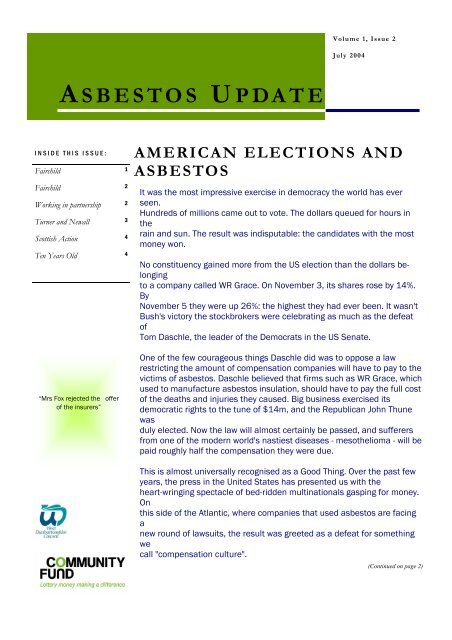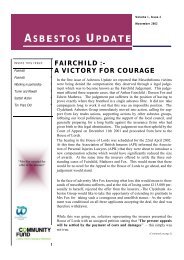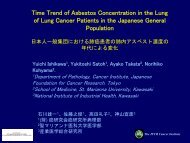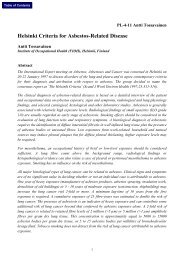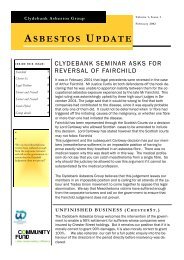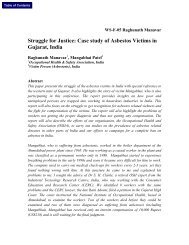Newsletter - July 2004 - Clydebank Asbestos Group
Newsletter - July 2004 - Clydebank Asbestos Group
Newsletter - July 2004 - Clydebank Asbestos Group
Create successful ePaper yourself
Turn your PDF publications into a flip-book with our unique Google optimized e-Paper software.
Volume 1, Issue 2<br />
<strong>July</strong> <strong>2004</strong><br />
A SBESTOS UPDATE<br />
INSIDE THIS ISSUE:<br />
Fairchild 1<br />
Fairchild 2<br />
Working in partnership 2<br />
Turner and Newall 3<br />
Scottish Action 4<br />
Ten Years Old 4<br />
“Mrs Fox rejected the offer<br />
of the insurers”<br />
AMERICAN ELECTIONS AND<br />
ASBESTOS<br />
It was the most impressive exercise in democracy the world has ever<br />
seen.<br />
Hundreds of millions came out to vote. The dollars queued for hours in<br />
the<br />
rain and sun. The result was indisputable: the candidates with the most<br />
money won.<br />
No constituency gained more from the US election than the dollars belonging<br />
to a company called WR Grace. On November 3, its shares rose by 14%.<br />
By<br />
November 5 they were up 26%: the highest they had ever been. It wasn't<br />
Bush's victory the stockbrokers were celebrating as much as the defeat<br />
of<br />
Tom Daschle, the leader of the Democrats in the US Senate.<br />
One of the few courageous things Daschle did was to oppose a law<br />
restricting the amount of compensation companies will have to pay to the<br />
victims of asbestos. Daschle believed that firms such as WR Grace, which<br />
used to manufacture asbestos insulation, should have to pay the full cost<br />
of the deaths and injuries they caused. Big business exercised its<br />
democratic rights to the tune of $14m, and the Republican John Thune<br />
was<br />
duly elected. Now the law will almost certainly be passed, and sufferers<br />
from one of the modern world's nastiest diseases - mesothelioma - will be<br />
paid roughly half the compensation they were due.<br />
This is almost universally recognised as a Good Thing. Over the past few<br />
years, the press in the United States has presented us with the<br />
heart-wringing spectacle of bed-ridden multinationals gasping for money.<br />
On<br />
this side of the Atlantic, where companies that used asbestos are facing<br />
a<br />
new round of lawsuits, the result was greeted as a defeat for something<br />
we<br />
call "compensation culture".<br />
(Continued on page 2)
<strong>Asbestos</strong> Update<br />
Page 2<br />
(Continued from page 1)<br />
Compensation culture has usurped political correctness, welfare cheats,<br />
single mothers and new age travellers as the right's new bogeyman-inchief.<br />
According to the Confederation of British Industry (CBI), the Conservative<br />
party and just about every newspaper columnist in Britain, it threatens<br />
very soon to bankrupt the country.<br />
That there is no evidence to support such a claim, is, as always,<br />
irrelevant. Despite the legalisation in 2000 of "no win, no fee" lawsuits,<br />
the total cost of compensation cases in Britain has remained, in real<br />
terms, static since 1989. The two biggest claims-marketing companies -<br />
the<br />
great beneficiaries of compensation culture - have both gone bust. Last<br />
year the number of accident claims fell by 9.5%. The government's Better<br />
(Continued on page 3)<br />
“Courage was<br />
rewarded with a<br />
victory for the<br />
applicants”
<strong>Asbestos</strong> Update Page 3<br />
Regulation Task Force, which at other times has taken the part of big<br />
business, bluntly reports that "the compensation culture is a myth".<br />
None of this should surprise us. It is no easier to win a case under the<br />
"no win, no fee" system than it was to win a case brought with the help of<br />
legal aid. You still have to convince a judge that the other person had a<br />
duty of care towards you, that they were at fault and that they should have<br />
foreseen the risk. Because awards are made by judges, not juries, there's<br />
very little chance of winning one of the vast settlements people seem to<br />
secure in the US for bumping into a lamp post or setting fire to their own<br />
hair. Under the new system, the claimant's lawyers get stung for all the<br />
bills racked up by both sides if he loses. They are not going to take his<br />
case to court unless it's pretty certain to succeed.<br />
Of course, there are malingerers who try to play the system, and, of<br />
course, private companies and public services have to respond to the<br />
frivolous suits they bring. But while the newspapers delight in telling us<br />
about people who sue the church for acts of God, they don't report that in<br />
the UK such cases almost always fail.<br />
But compensation culture is a convenient bogeyman, because it allows big<br />
business to associate its victims - such as the 3,500 people who die every<br />
year in Britain as a result of exposure to asbestos - with scroungers and<br />
conmen. It also opens a new front in their perpetual war against regulation.<br />
Last week John Sunderland, the president of the CBI, thundered that<br />
"Britain's greatness was built on risk-taking". Today, thanks to the<br />
compensation culture, we suffer from a "reduction in personal<br />
responsibility" and a "collective aversion to risk". We need to learn from<br />
China, whose businesses enjoy the same "fearlessness about risk" as<br />
Britain's did during the industrial revolution.<br />
What Sunderland has done is deliberately conflate two kinds of risk: the<br />
risk to which we expose ourselves, and the risk to which we expose other<br />
people. In the heroic age of industrial accidents, the "risk-taking<br />
entrepreneurs" might have lost their money if their products did not find a<br />
market, but their profits were dependent upon the risks of losing limbs,<br />
eyes, lungs and lives they imposed on their workforce. China's<br />
"fearlessness about risk" means that Chinese bosses are allowed to kill<br />
their workers. Sunderland is calling for precisely the "reduction in<br />
personal responsibility" he affects to despise. The entrepreneur shall not<br />
be held responsible for any of the risks he dumps on other people.<br />
The shadow chancellor, Oliver Letwin, gave an almost identical speech to<br />
the Centre for Policy Studies in September. "The call to minimise risk is a<br />
call for a cowardly society," he said. "If we are to have a courageous<br />
society rather than a cowardly society, we need to abandon the rhetoric of<br />
risk minimisation." The shadow chancellor failed to explain why it is<br />
courageous to expose your workers to asbestos. Or why it is courageous to<br />
lie down meekly and die when your lungs have been trashed by your brave<br />
employer.<br />
The <strong>Clydebank</strong> <strong>Asbestos</strong><br />
<strong>Group</strong> committee members<br />
are as follows….<br />
Secretary<br />
Margaret Lilly<br />
Chair<br />
Sam Irvine<br />
Vice Chair<br />
Bob Dickie<br />
Treasurer<br />
David Colraine<br />
• Jimmy Cloughley<br />
• CharlesMarshall<br />
• Colin MacQueen<br />
• Joan Baird<br />
• Carol Ann Wright<br />
Monitoring Officers<br />
• Tom Gorman<br />
• John Hepburn<br />
Administrator<br />
• Janice Strain<br />
<strong>Asbestos</strong> Advice Counsellor<br />
• Alex Cunningham<br />
“Why cant they claw<br />
back money from the<br />
employers for a change”.
Phone: 0141 951 1008<br />
Fax: 0141 562 0045<br />
Email: clydebankasbestos@supanet.com<br />
<strong>Clydebank</strong><br />
<strong>Asbestos</strong><br />
Working for the Victims of<br />
<strong>Asbestos</strong><br />
Scottish Action on <strong>Asbestos</strong><br />
In April 2002 a resolution was passed at the Scottish Trades Union Congress<br />
asking for support for asbestos victims. The Composite motion was moved by<br />
the Fire Brigades Union seconded by Midlothian Trades Union Council and supported<br />
by Amicus, the T & GWU and Dumbarton Trades Union Council. It called<br />
<strong>Clydebank</strong> <strong>Asbestos</strong> <strong>Group</strong><br />
8 Crown Avenue<br />
Radnor Park<br />
CLYDEBANK<br />
G81 3BW<br />
for support for Petition 336 ; an overturn of the Fairchild decision as well as<br />
tightening up the process of removing asbestos. This resolution was passed<br />
unanimously.<br />
A further outcome of that resolution has been the formation of a Scotland wide<br />
<strong>Asbestos</strong> Campaign <strong>Group</strong> which has been called Scottish Action on <strong>Asbestos</strong><br />
consisting of major Trades unions as well as Clydeside Action on <strong>Asbestos</strong> and<br />
OUR 10TH ANNIVERSARY<br />
<strong>Clydebank</strong> <strong>Asbestos</strong> <strong>Group</strong><br />
8Crown Avenue<br />
Radnor Park<br />
<strong>Clydebank</strong><br />
G81 3BW<br />
Phone 0141 951 1008<br />
Or 0141 562 0126<br />
David Colraine an original member of the group explains. The group started<br />
through a mutual friend of ours David Dyball who became ill. Joe McAuley<br />
had visited Dave at his home. David Dybal had said that he was suffering<br />
from mesothelioma , a word I couldn’t even pronounce at that time. I asked<br />
him what it was and he said it was related to asbestos. After consultation a<br />
group was formed, Joe McAuley, John Carney, Eddie Kelly and myself and we<br />
had a few meetings in the Hub, we then decided to contact Clydeside Action<br />
who were based in Glasgow. Soon after that we went looking for premises<br />
in <strong>Clydebank</strong> as it was agreed that travelling to Glasgow would be too much<br />
for people who were suffering from the disease. That is when the <strong>Clydebank</strong><br />
<strong>Asbestos</strong> <strong>Group</strong> was initiated at its present site in Crown Ave.<br />
Charlie Baird, Social Worker for <strong>Clydebank</strong> District Council, was our main<br />
contact for advice and source of funding, his efforts were a major factor in<br />
establishing the group. He taught us the “correct way of doing things”.<br />
Sam Irvine came in to do a bit of maintenance and never left. Peter O’Neal<br />
and John Henderson also joined the group at that time.<br />
Over the years the group as gone from strength to strength with various volunteer<br />
workers.<br />
<strong>Clydebank</strong> <strong>Asbestos</strong> <strong>Group</strong> held an Awareness Day which attracted various<br />
organisations. As a result a partnership was formed between <strong>Clydebank</strong><br />
<strong>Asbestos</strong> <strong>Group</strong>, <strong>Clydebank</strong> Health Issues <strong>Group</strong>, Greater Glasgow Health<br />
Board and West Dunbartonshire Council .<br />
More recently, other people have arrived on the scene such as Jimmy<br />
Cloughley who has been prominent in the excellent campaign work which<br />
he has been doing. This coupled with the work done by his colleagues David<br />
Colraine, Sam Irvine, Colin McQueen, Margaret Lilly, Bobby Dickie, Joan<br />
Baird, not to mention our full timers Alex and Janice, has helped to gel the<br />
group into a positive campaigning group that truly represents asbestos sufferers.


